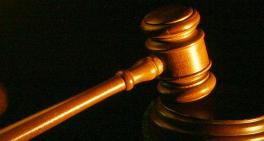Court weighs securities fraud class-action cases
Corporate Law
The Supreme Court is considering whether to abandon a quarter-century of precedent and make it tougher for investors to band together to sue corporations for securities fraud.
The justices hear arguments Wednesday in an appeal by Halliburton Co. that seeks to block a class-action lawsuit claiming the energy services company inflated its stock price.
A group of investors says it lost money when Halliburton's stock price dropped after revelations the company misrepresented revenues, understated its liability in asbestos litigation and overstated the benefits of a merger.
Justices threw out the company's first attempt to block the lawsuit in 2011. But Halliburton is now urging the court to overturn a 25-year-old decision that sparked a tidal wave of securities-related, class-action lawsuits against publicly traded companies and has led to billions in settlements.
The court's 1988 decision in Basic v. Levinson says shareholders who claim they were defrauded by false statements in securities filings don't have to prove they actually relied on the statements. Rather, the court reasoned that any misrepresentation would be reflected in the current stock price. Even if investors are not aware of the misstatements, they are presumed to be aware of them because they affect the stock price.
This presumption, known as the "fraud-on-the-market theory," has become the driving force for modern class-action securities cases. But some economists have questioned whether this theory makes sense anymore, saying it doesn't account for the sometimes random and arbitrary nature of stock trading.
Related listings
-
High court won't hear appeal from former Qwest CEO
Corporate Law 07/23/2017The Supreme Court won't hear an appeal from former Qwest Communications International Inc. CEO Joseph Nacchio seeking an $18 million tax refund on money he gained from illegal stock sales.The justices on Monday left in place a lower court ruling that...
-
Court: Ignorance about allergy medicine crime no excuse
Corporate Law 07/23/2017Just because a man previously convicted of methamphetamine-related crimes didn't know it was now illegal for him to buy over-the-counter allergy medicine given his criminal history doesn't mean his rights were violated, a divided North Carolina Supre...
-
Court: Ohio E-School Can't Delay Repayment of $60M to State
Corporate Law 07/03/2017ECOT's reported enrollment of 15,000 Ohio students makes it one of the largest online charter schools in the U.S.Democrats jumped on the court's decision to pile criticism on the school, which has struggled for years against attacks on its enrollment...

Thai National Sentenced, Faces Deportation for Operating Immigration Fraud Scheme
Nimon Naphaeng, 36, a native and citizen of Thailand, who resided in Wakefield, R.I., was sentenced Monday to 27 months in federal prison for running an immigration fraud scheme that defrauded more than 320 individuals, most of them immigrants, of at least $400,000, and perhaps more than $518,000.
The scheme included the unauthorized filing of false asylum applications on behalf of individuals who did not request, nor authorize, the applications.
“U.S. Citizenship and Immigration Services does not tolerate immigration fraud of any kind,” said Susan Raufer, director of the USCIS Newark Asylum Office. “We are proud of our role in uncovering this fraud scheme and bringing the perpetrator to justice.”
At sentencing, U.S. District Court Chief Judge William E. Smith ordered a provisional amount of restitution of $400,000. The final amount of restitution will be determined subject to additional victims being identified and additional court filings over the next 90 days. According to court documents already filed by the government, restitution in this matter may exceed $518,300. During the investigation, the government seized $285,789.31 from Naphaeng. The forfeited funds will be applied toward restitution for victims of Naphaeng’s crimes.




